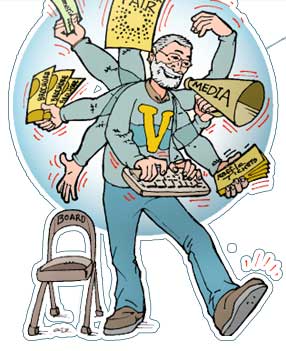








War Still a Daily Reality Despite Remembrance Day
Brandon Sun “Small
World” Column, Monday, November 4 / 13
Zack Gross
Zack Gross
Remembrance Day is coming up a week from now. Our family marks the day by connecting with elder relatives who were touched by World War II more than 70 years ago.
My father-in-law, now in his late eighties, lost a brother in the war and has never fully recovered from that loss. We also like to watch the national television broadcast of the Parliament Hill ceremony and it never fails to move us.
Unfortunately, Remembrance Day isn’t given the respect it once had, despite the efforts of schools and community organizations to keep it alive. Some provinces don’t have it as a “day off”, something that surprised me when I visited Ontario a few years ago. Many jurisdictions have malls open, albeit on a Sunday schedule. Of course, lots of people use it as a day to sleep in or go hunting and don’t dwell on the significance of the day.
But we do live in a different world today. Possibly, we need to focus on the on-going wars of the present and the terrible loss of life, limb and property that comes with war, rather than our own Eurocentric view of war that dips into a past that few younger people can relate to. Maybe what we need to be talking about is why, knowing the horrors that war can bring, we allow them to continue.
Research shows that an estimated 51 million people were killed in wars between 1945 and 2000, the half century after World War II. And the past decade has been no better. “Highlights” (or low lights) of this death tolls includes genocides in Central East Africa (Rwanda and Sudan) and Southeastern Europe (Serbia, Bosnia, Croatia, etc.).
Political strife and international war in Southeast Asia (Vietnam, China) also have taken a huge toll. Some parts of Central and South America have also seen significant loss of life in civil war or armed dictatorship crackdowns on their populations. As ever, Western Europe and North America have been largely free of conflict deaths.
Project Ploughshares, a national church initiative on peace based in Waterloo, ON, just published this week their 2012 Armed Conflict Report. In it, they list 26 conflicts taking place in 23 countries around the globe. One of these which we hear a lot about in the media is the Syrian “civil war” where 70,000 people died last year and 730,000 were displaced, creating a humanitarian emergency.
Another is the regional war that has centred on the Democratic Republic of Congo, a large resource-rich nation with several armies, countries and corporations fighting over and extracting its wealth. In the DRC, over the past decade, five million people have died in the conflict.
Other countries that have made the news for conflict and appear on this list are Iraq and Afghanistan, Sudan and Somalia, Pakistan and India. While each country is unique, certain themes persist when conflict is considered: economic disparities, religious or tribal differences, governance issues such as dictatorship or weak central leadership, and resource wealth coveted by others. Indeed, as in so many instances, greed and fear are at the heart of problems, both global and local.
What does all this mean to us? Doesn’t the sacrifice of our soldiers in the World Wars and other “smaller” conflicts fill up our agenda? No doubt, we need to keep one eye on the past. And we find it more relevant to focus on the contribution and sacrifice of Canadians in conflict situations. However, it is the “here and now” that we need to better understand because today’s conflicts also shape our lives.
Examples? War has currently displaced 45.2 million people in our world. In hard economic facts, that is both a huge loss of productivity and an enormous cost for the world to deal with. It is also a festering situation of current insecurity and even hatred that will lead to future conflicts. War not only kills and maims people, but it destroys property and infrastructure (schools, hospitals, factories, agricultural land, roads, bridges, power lines) which can take a generation to replace.
The way war is waged today means that rape is an everyday occurrence for women caught up in conflict or living in displacement camps. It means that armies include tens of thousands of children pressed into service with the use of liquor, drugs and brutalizing tactics. It means that war now kills more civilians than soldiers.
The reality of “today’s war” might be one way to revitalize interest in Remembrance Day. The classic messages at gravesites, legion halls and monuments need to be reinvented to bring immediacy to them, or we are just throwing fancy words and hopes at a problem that won’t easily go away without greater understanding and resolve.
Zack Gross works for the Manitoba Council for International Co-operation (MCIC), a coalition of more than 40 international development organizations.
* * * * *
Return to Articles page
Return to Articles page